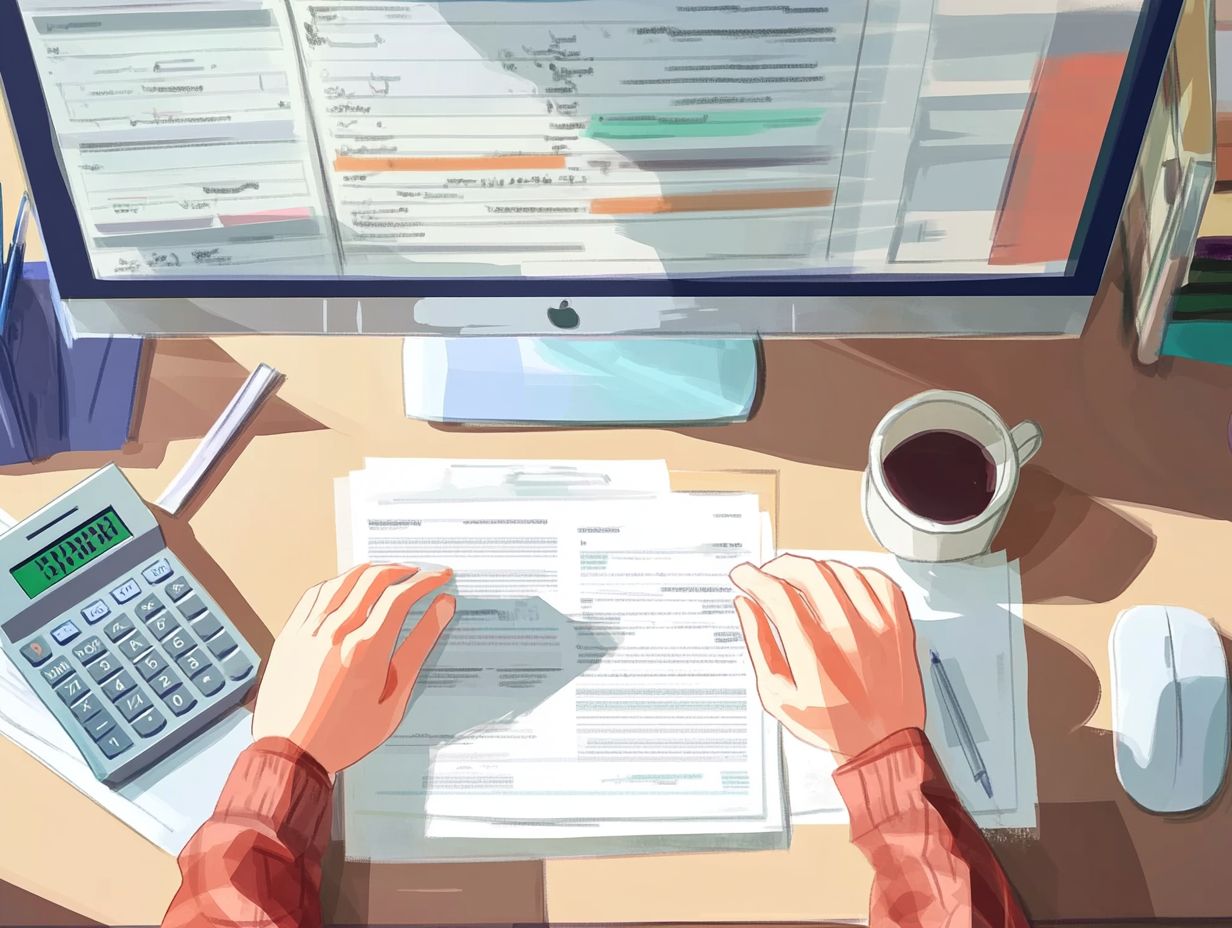How to Correct Errors on Your Credit Report
Your credit report serves as a vital component of your financial landscape. It influences everything from loan approvals to the interest rates you receive.
However, errors can sneak in, resulting in potentially costly repercussions.
This article delves into the importance of maintaining an accurate credit report, identifies typical errors to watch for, and provides a clear roadmap for correcting them. You ll also find best practices for monitoring your credit going forward, empowering you to stay in control of your financial well-being.
Contents
- Key Takeaways:
- The Importance of a Correct Credit Report
- Identifying Errors on Your Credit Report
- Steps to Correct Errors on Your Credit Report
- Monitoring Your Credit Report for Future Errors
- Final Tips for Maintaining a Correct Credit Report
- Frequently Asked Questions
- What is a credit report and why is it important to correct errors?
- How can I obtain a copy of my credit report?
- What are some common errors that can appear on a credit report?
- How do I dispute an error on my credit report?
- How long does it take to correct an error on a credit report?
- What should I do if the error on my credit report is not resolved?
Key Takeaways:

- A correct credit report is crucial for financial stability and future opportunities.
- Common types of errors on credit reports include incorrect personal information and false negative marks.
- To correct errors, contact credit bureaus, gather evidence, and dispute inaccuracies. Regularly monitoring your credit report can prevent future errors.
The Importance of a Correct Credit Report
A pristine credit report is essential for you as an American consumer. It directly influences your ability to borrow money and secure loans or credit cards from financial institutions.
When credit bureaus like Experian, Equifax, and TransUnion provide accurate reporting, you gain access to your credit information without the worry of misleading details or errors that could adversely affect your credit score.
Recognizing the importance of maintaining a clean credit file is crucial for safeguarding against identity theft and ensuring your financial stability in the long run.
Why Errors on Your Credit Report Matter
Errors on your credit report can wield significant influence over your financial well-being. They can lead to reduced credit scores, loan application denials, and inflated interest rates.
These inaccuracies can arise from various sources, such as clerical mistakes or unreported accounts. A simple typographical error in your payment history could distort your reliability, prompting lenders to categorize you as a higher risk.
Additionally, unreported credit accounts might skew the assessment of your overall credit utilization ratio, which is the amount of credit you are using compared to your total available credit. Addressing these errors without delay is essential, as unresolved inaccuracies can lead to ongoing disputes complicating future financial endeavors.
Identifying Errors on Your Credit Report
Identifying errors on your credit report is essential for preserving your financial well-being. Inaccuracies can arise from various sources, including identity theft or outdated personal information.
Taking the time to review your report carefully gives you the power to address these issues and ensure your credit reflects your true financial status.
Common Types of Errors
Common errors found on credit reports include clerical mistakes, inaccurate details, missing accounts, and accounts that simply don t belong to you.
These inaccuracies can stem from various sources, such as data entry blunders or outdated information reported by lenders. For instance, a clerical error might inaccurately list a payment amount, making it seem like you ve missed payments when you haven t.
Inaccurate details, such as erroneous balances or incorrectly recorded late payments, can adversely affect your credit score. Missing accounts can create gaps in your credit history, which lenders carefully examine during loan applications.
If an account appearing on your report doesn t belong to you, it can cause significant confusion and unfairly diminish your creditworthiness. Addressing these errors swiftly is essential for maintaining a robust financial profile.
Don t wait! Errors can snowball into bigger issues if left unchecked. Start checking your credit report today to keep your financial future bright!
How to Spot Errors

To effectively spot errors on your credit report, it’s crucial for you to regularly review your credit report and watch for discrepancies in your personal information and account balances. This process not only helps you maintain a healthy credit score but also allows you to identify any fraudulent activity that might have slipped under your radar.
Start by gathering all relevant documents, such as billing statements and loan agreements. You can cross-reference important details like account numbers, payment history, and outstanding balances. If you uncover any inconsistencies during your review, your next step is to initiate an investigation by contacting the credit bureau.
Make sure to document each step along the way, including your communication with creditors. This will strengthen your claims of inaccuracies and streamline the resolution process.
Steps to Correct Errors on Your Credit Report
Correcting errors on your credit report entails a meticulous dispute process. This process involves reaching out to credit bureaus, submitting the necessary supporting documents, and understanding the importance of disputing credit report errors in a timely manner.
By following this systematic approach, you can effectively enhance the accuracy of your credit report.
Contacting Credit Bureaus
When you reach out to credit bureaus to correct errors on your credit report, you must present clear and concise information in your dispute letter to ensure accurate reporting.
This means not only pinpointing the specific inaccuracies but also providing supporting documentation, such as bank statements or payment confirmations, that back up your claims. Remember to include your personal identification details your name, address, and Social Security number so the bureau can locate your file without any hiccups.
You should also understand your rights under consumer protection laws. This knowledge can empower you throughout this process, allowing you to advocate for yourself effectively and hold credit bureaus accountable for their mistakes. It can truly make a world of difference in achieving a favorable outcome.
Gathering Evidence and Documentation
Gathering evidence and documentation is crucial in the dispute process, as it substantiates your claims about errors on your credit report.
To effectively challenge inaccuracies, it s advantageous for you to collect a range of supporting documents. For example, payment history records can demonstrate your timely payments and pinpoint discrepancies. Any financial statements like bank and credit card statements can provide further validation of your financial behavior. As you gather these items, you not only strengthen your position but also showcase a proactive approach to resolving the issue.
When addressing disputes, remember that the more detailed and organized your evidence is, the clearer your case will be to credit reporting agencies. This significantly boosts your chances of a favorable outcome.
Disputing Errors
Disputing errors on your credit report can be accomplished through online submissions, letters, or phone calls to the reporting companies. Act quickly to facilitate a thorough investigation.
Once you initiate the dispute process, be prepared for varying response times. Typically, credit bureaus are required to investigate and respond within 30 days. To ensure a smooth review, it s crucial to provide comprehensive documentation and clear explanations of the discrepancies.
After submitting your dispute, keep a detailed record of communications and follow up on any unresolved issues. This diligence will significantly increase your chances of success. It not only helps clarify misunderstandings but also ensures that your credit profile remains accurate over time.
Monitoring Your Credit Report for Future Errors

Monitoring your credit report for potential errors is a proactive strategy that empowers you to safeguard against identity theft while ensuring your credit history remains accurate and current.
Taking this step not only protects your financial health but also enhances your ability to make informed decisions about your creditworthiness.
Best Practices for Regularly Checking Your Credit Report
Implementing best practices for regularly checking your credit report is crucial for your financial protection and for maintaining an accurate credit history.
To stay well-informed about your credit status, aim to check your credit report at least once a year. However, more frequent reviews can offer you deeper insights.
Utilizing resources like annualcreditreport.com allows you to access your credit reports for free from each of the three major credit bureaus. This way, you can catch errors or potential fraudulent activities early on.
Setting reminders to monitor your credit scores monthly can change the game, keeping you informed about any changes and trends over time. By staying alert to these updates, you empower yourself to take proactive measures in managing your financial health.
Final Tips for Maintaining a Correct Credit Report
Maintaining an accurate credit report demands your vigilance, a commitment to sound credit habits, and a dedication to making timely payments on all your credit accounts.
By staying proactive and disciplined, you can safeguard your financial reputation and open doors to better opportunities.
Building Good Credit Habits
Building good credit habits means you ll want to consistently make those timely payments, manage your credit accounts wisely, and keep your spending low.
To elevate your credit standing even further, develop a realistic budget that balances funds for essentials and discretionary spending.
Avoid the trap of late payments, as they can seriously hinder your ability to repay borrowed money and keep your credit profile in good shape.
Also, be cautious about opening too many new accounts in a short period; this can lead to unnecessary inquiries that might drag your score down.
Understanding the long-term benefits of maintaining good credit practices like lower interest rates on loans and improved chances for renting or buying a home can be a powerful motivator to stay disciplined in your credit management.
Frequently Asked Questions
What is a credit report and why is it important to correct errors?

A credit report is a detailed summary of your credit history and financial behavior. It is used by lenders, landlords, and potential employers to determine your ability to repay borrowed money. Correcting errors on your credit report is important because these errors can negatively impact your credit score and ability to obtain credit in the future.
How can I obtain a copy of my credit report?
If you’re new to credit, you might wonder how to obtain your credit report. You are entitled to a free copy of your credit report from each of the three major credit reporting agencies (Equifax, Experian, and TransUnion) every 12 months. You can request your reports online, by phone, or by mail. You may also purchase a copy of your credit report directly from the credit reporting agencies.
Don’t wait! Get your free credit report today and ensure your financial peace of mind.
What are some common errors that can appear on a credit report?
Some common errors on credit reports include incorrect personal information, accounts that do not belong to you, inaccurate account balances, and late payments that were actually made on time. It is important to carefully review your credit report to identify any errors.
How do I dispute an error on my credit report?
To dispute an error on your credit report, you can contact the credit reporting agency that issued the report. You can also dispute the error directly with the creditor who provided the incorrect information. It is recommended to submit your dispute in writing and include any supporting documentation.
How long does it take to correct an error on a credit report?
Correcting an error on your credit report can take some time. The credit reporting agency must investigate your dispute within 30 days.
If the error is confirmed, expect another 30 days for the agency to update your report. Complex disputes may take longer, so it s best to follow up regularly.
What should I do if the error on my credit report is not resolved?
If you re not satisfied with the resolution, submit a complaint to the Consumer Financial Protection Bureau (CFPB). They will forward your complaint to the credit agency and help address the issue.
Consider seeking legal advice if the error has harmed your credit or finances significantly. Act quickly to protect your credit!






